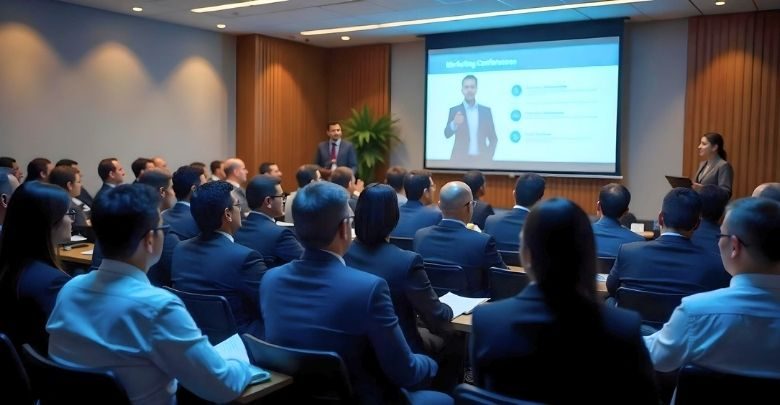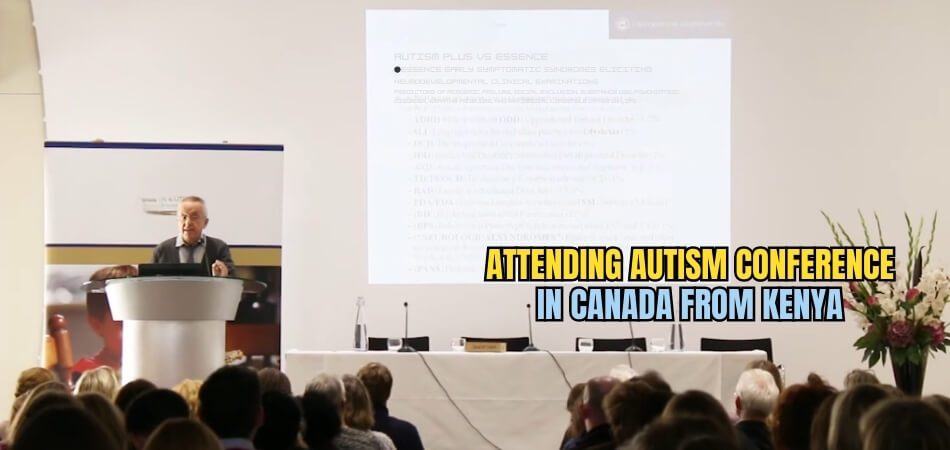Autism and disability studies conferences in Canada provide invaluable opportunities for professionals to engage with the latest research and advancements in the field. If you are residing in Kenya and thinking “How to attend the autism and disability studies conference in Canada from Kenya?” the approach involves simple yet detailed preparation.
Begin by confirming the conference dates and securing your registration early. Following that, you will need an invitation letter from the conference organizers, which is a crucial component of your Canadian visa application. Once your visa is obtained, you can proceed to organize your travel and accommodations.
You will have the opportunity to delve into a vast pool of knowledge and actively participate in discussions. For more in-depth instructions, continue reading our detailed article.
Autism and Disability Studies Conference in Canada – What Are Its Core Purposes?
The autism and disability studies conference in Canada aims to improve awareness and understanding of these essential topics. It brings together experts, educators, and advocates to share knowledge, insights, and strategies. Attendees can gain practical tools to support individuals with autism and disabilities in different settings.
Another purpose of the event is to promote collaboration among professionals, organizations, and communities. This enables better support systems, services, and opportunities for individuals facing these challenges. Participants engage in meaningful discussions that contribute to creating inclusive societies for all.
The conference provides a valuable platform for sharing innovative ideas and the latest research findings. Attendees have the opportunity to learn about new techniques and programs that make a real impact. By attending the autism and disability studies conference in Canada with invitation letter, participants can engage with experts in the field and expand their knowledge. Registration is required to secure a spot at the event.
What Attracts International Attendees to Participate in Autism and Disability Studies Conference in Canada?
The autism and disability studies conference in Canada attracts international attendees due to its valuable offerings and opportunities. This event provides a platform for learning, networking, and exploring new research in the field. Here are the key factors that draw global participants:
- Diverse Range of Topics: The conference covers a broad range of topics related to autism and disabilities. This attracts attendees interested in gaining comprehensive knowledge on various aspects of the field.
- Networking Opportunities: Participants have the chance to connect with professionals, researchers, and advocates from around the world. These connections facilitate collaborations and long-lasting partnerships.
- Access to Latest Research: Attendees gain access to the latest research and developments in autism and disability studies. This keeps them updated on new treatments, techniques, and programs.
- Interactive Workshops and Sessions: The event includes engaging workshops that allow attendees to participate actively. These hands-on sessions provide practical tools and strategies to apply in real-world settings.
- Renowned Speakers and Experts: Internationally recognized speakers share their insights and experiences during the conference. This attracts attendees eager to learn from the best in the field.
- Global Representation: The conference hosts participants from various countries, enhancing the international perspective. This diversity encourages a richer exchange of ideas and cultural approaches.
- Invitation Letters for Visa Applications: The availability of an autism and disability studies conference in Canada with invitation letter simplifies the visa process for international attendees. This convenience encourages more participants to join the event.
- Cultural Experience in Canada: Attendees not only gain knowledge but also enjoy experiencing Canadian culture. The country’s hospitality and scenic beauty make the trip memorable.
How to Attend the Autism and Disability Studies Conference in Canada from Kenya?
A thoughtful preparation is necessary for a Kenyan to attend the autism and disability studies conference in Canada. To ensure a smooth journey, you should know the steps involved. Here’s a step-by-step guide to help you participate in this important event:
Step 1: Find the Conference Dates and Venue
Check the official website for the conference dates, venue, and details. Mark the dates on your calendar to plan early. This allows you to manage your time and obligations before attending. Staying informed helps avoid missing important updates.
Step 2: Complete the Registration Process
Register on the conference’s official website as soon as the registration opens. Fill in your personal information accurately to ensure a valid registration. Ensure you complete any required payment to confirm your spot. A prompt registration also helps you secure your participation effectively.
Step 3: Obtain an Invitation Letter
Request an invitation letter from the conference organizers after successful registration. This letter is crucial for your visa application. Ensure that your name and other details match your passport to avoid delays. An accurate invitation letter is mandatory for visa processing.
Step 4: Apply for a Canadian Visa
Apply for a Canadian visa at the nearest embassy or consulate. Include all necessary documents, such as the invitation letter, passport, and proof of funds. Be prepared for an interview, if required, during the visa process. Early application increases your chances of timely approval.
Step 5: Arrange Travel and Accommodation
Book your flight to Canada well in advance to find the best rates. Choose accommodations near the conference venue for easy access. Research and compare hotel options to find a budget-friendly choice. Having a confirmed itinerary ensures a smooth arrival in Canada.
Step 6: Prepare for the Conference
Gather all necessary materials, such as notepads, laptops, and business cards, before attending. Review the agenda to identify key sessions where you want to participate in autism and disability conference activities. This preparation ensures you can engage fully in the sessions, and active participation enhances your learning experience.
Step 7: Attend Networking Events
Make time to attend networking sessions and informal gatherings during the conference. These events offer great opportunities to meet fellow attendees. Building connections can open doors for future collaborations or projects. Always carry business cards to exchange contacts.
Step 8: Explore Canadian Culture
Take some time to explore Canadian culture and attractions after the conference. Visit local museums, parks, or historical sites for a memorable trip. Experiencing Canada’s hospitality adds to the overall conference experience. This cultural exposure enhances your visit beyond professional learning.
Types of Autism and Disability Studies Conferences in Canada?
Yes, various types of autism and disability studies conferences are held in Canada. These events cater to different interests and needs within the field. They offer valuable opportunities for learning, networking, and sharing research. Here are some common types of conferences you might find in Canada:
Academic Autism Research Conferences
Academic conferences focus on presenting the latest research findings related to autism. Researchers, scholars, and professionals gather to discuss theories, studies, and data. Participants engage in discussions about new treatment approaches and support mechanisms. These events often feature keynote speakers who are leading experts in the field.
Autism and Disability Advocacy Conferences
Advocacy conferences aim to raise awareness and promote inclusion for individuals with autism and disabilities. They bring together activists, families, and educators to share experiences. Workshops at these events teach effective advocacy strategies and tools. Attendees can learn how to influence policies and enhance support systems.
Professional Development Conferences
These conferences focus on training professionals in autism and disability support services. Sessions cover therapy techniques, behavioral interventions, and educational programs. Participants receive hands-on training from experts to improve their skills. The event provides certification courses for attendees seeking professional growth.
Parent and Caregiver Conferences
Parent and caregiver conferences offer practical advice and support for those caring for individuals with autism. Topics include communication strategies, stress management, and effective support at home. These events provide a community environment for sharing personal experiences. Workshops help parents and caregivers learn better ways to manage daily challenges.
Multidisciplinary Autism and Disability Events
These events bring together professionals from various fields, including medicine, education, and social work. Attendees learn about integrated approaches to supporting individuals with autism. Topics range from medical treatments to inclusive education policies and community engagement. The goal is to foster collaboration and holistic support for individuals.
Tips for Kenyans to Avoid Mistakes While Attending Autism and Disability Studies Conference
Participating in an autism and disability studies conference in Canada is an excellent opportunity for Kenyan participants to gain insight and network. However, if you plan to attend autism and disability conference, you need to be well-prepared to avoid common mistakes. Here are some practical tips to ensure a smooth experience.
- Plan Your Travel Early: Begin your travel preparations early to avoid last-minute issues. This includes booking flights, applying for visas, and arranging accommodations promptly.
- Become familiar with Conference: Etiquette Familiarize yourself with the cultural norms and conference etiquette in Canada. This helps you engage positively with other attendees and presenters.
- Stay Organized During the Event: Keep all necessary documents, including your invitation letter and conference schedule, in one place. This helps you avoid confusion and delays.
- Be Punctual for All Sessions: Arrive on time for all sessions to show respect for speakers and other participants. Punctuality also ensures you don’t miss valuable content.
- Engage Actively in Discussions: Participate in workshops and discussions to gain more insights and practical skills. Asking questions demonstrates interest and encourages learning.
- Prepare for Networking Opportunities: Bring business cards and be ready to connect with professionals. This improves your chances to network and build meaningful collaborations.
- Keep Notes and Follow-Up: Take notes during presentations to retain key information. Follow up with contacts after the event to maintain new relationships.
Frequently Asked Questions
Planning and preparing for the autism and disability studies conference in Canada is essential. To help you manage the process smoothly, here are answers to some frequently asked questions (FAQs). These responses address specific aspects you may encounter before and during your journey.
How Can I Find the Right Autism and Disability Conference in Canada?
To find the right conference, start by researching upcoming events on official websites or academic platforms. Look for conferences that align with your interests and professional goals. Checking the event agenda can also help ensure it suits your learning needs.
Do I Need to Book Accommodation Before My Visa Gets Approved?
While it’s not mandatory, booking refundable accommodation can strengthen your visa application. It shows proof of your intent to attend the event. Ensure the location is close to the conference venue for convenience and cost-effectiveness.
What Documents Are Required at The Conference Venue?
Carry your invitation letter, registration confirmation, identification, and business cards. Also, bring any relevant documents related to your research or presentation, if applicable. Keeping these documents organized will ensure a hassle-free check-in at the conference.
Can I Bring Promotional Materials to The Conference?
Yes, you can bring brochures, flyers, or business cards to share your work or organization. Ensure your materials are professional and informative. Distributing them during networking sessions can help build connections with potential collaborators or employers.
What Kind of Sessions Can I Expect at The Conference?
You can expect a mix of keynote speeches, panel discussions, workshops, and poster presentations. Each session offers valuable insights into research, advocacy, and best practices. Review the agenda beforehand to plan which sessions align best with your interests.
Bottom Line
It takes careful planning and preparation to attend the autism and disability studies conference in Canada from Kenya. Start by confirming the conference dates, completing registration, and obtaining an invitation letter, which is vital for your visa application.
As you consider how to attend the autism and disability studies conference in Canada from Kenya, remember to apply for a Canadian visa early, arrange your travel and accommodation, and prepare for sessions actively. Engaging in networking events and exploring Canadian culture will enrich your overall experience.
By following these steps and tips, you can effectively participate in the conference, enhance your professional knowledge, and build meaningful connections.








